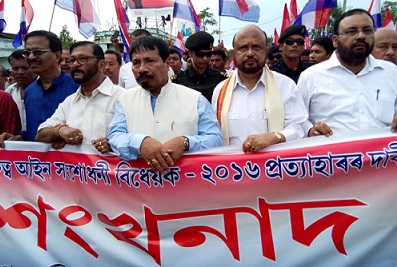
Assam: AGP's actual fight is to prove worth to big brother BJP in 3rd phase of polls

The much-romanticised goals of the six-year-long Assam agitation — Assamese sub-nationalist aspirations mainly banking on freedom from illegal immigrants — have long been replaced by power thrust, betrayal and corruption within the Asom Gana Parishad (AGP).
Today, the party, which was born out of the agitation in the 1980s as an offshoot of the powerful All Assam Students Union that spearheaded the movement with lofty ideals and slogans, finds itself at the crossroads of existence. Its leader and hero of the agitation, former Chief Minister Prafulla Kumar Mahanta, is a bewildered man not knowing what to do, which way to go, finally choosing to abstain from complete electoral participation.
The founder president of AGP, Mahanta, and his wife Jayashree, a former MP, did not cast their votes on April 18 as a mark of protest against BJP’s Citizenship (Amendment) Bill. They both have their names in the electoral roll in Nagaon Lok Sabha seat, which went to polls in the second phase of the 2019 Lok Sabha elections that saw 73% polling in Assam.
Back in January when protests against the bill were at a peak across the region, Mahanta and the AGP saw one-last chance for survival in politics in a state which has been stuck in a decades-long narrative. With the BJP hell bent on pushing the bill, the AGP withdrew its support to the ruling party in January. By March, AGP president Atul Bora with a few more leaders by his side announced to renew the ties. Mahanta, of course, stood his ground and opposed the reunion.
But who listens to Mahanta in Assam these days?
Even the AASU leaders refused to stand by Mahanta. Instead, AASU president Shankar Prasad Roy and general secretary Tapan Gogoi formally joined the BJP ahead of the elections.
Out of the state’s 14 seats in Assam, the ruling BJP has left three seats for the AGP — Kaliabor, Dhubri and Barpeta — and one for the third ally in the government, the BPF, in Kokrajhar (reserved for Schedule Tribe). The BJP has kept 10 seats for itself — Dibrugarh, Jorhat, Tezpur, Lakhimpur, Nagaon, Guwahati, Diphu, Mongoldoi, Silchar and Karimganj.
In the third and last phase of elections in Assam on April 23, it will be a litmus test for AGP in minority-dominated Dhubri and Barpeta. The seat-sharing deal between the BJP and the AGP makes it evident that the big brother has made it clear to the AGP that it either proves its credibility or get lost. The BJP, which has already hijacked the AGP’s anti-foreigners plank as well as the core Assamese Hindu vote bank, has now entrusted the junior partner to get the difficult-to-win seats of Dhubri and Barpeta.
Both the constituencies are strongholds of the All India United Democratic Front (AIUDF) that had the two seats in the 2014 elections. In 2014, the BJP won seven out of 14 Lok Sabha seats in Assam on its own while the the Congress and the All India United Democratic Front (AIUDF) got three each and one seat went to an Independent. The AGP, however, had failed to win a single seat
Dhubri
Traditionally, a Congress fortress, Dhubri chose to go with the Badruddin Ajmal-led AIUDF in 2009 and again in 2014. This time around, the AIUDF was hoping that the Congress would not field any strong candidates from Dhubri and Barpeta since the former has restricted itself to just three seats in the state to “avoid division of secular votes”. However, with the BJP constantly harping on about an “unholy understanding” between the Congress and the AIUDF, the grand old party’s desperation to distance it from Ajaml’s party has only increased.
The Congress has fielded Abu Taher Bepari, a two-time legislator from Golokganj Assembly constituency, up against Ajmal. The AGP, on the other hand, has fielded Jabed Islam, son of veteran Congress leader and former minister Zehirul Islam.
Barpeta
In minority-dominated Barpeta constituency, polarisation of votes will be the key to winning this seat. Barpeta too has traditionally been a Congress stronghold. For 63 years, the seat has been under the control of the grand old party except in 1991 and 1996 when CPM won from here. In 2014, AIUDF wrested it from Congress. In 2014, AIUDF’s Sirajuddin Ajmal (younger brother of Badrauddin Ajmal) won with 3,94,02 votes against BJP’s Chandra Mohan Patowary, who bagged 3,42,361 votes. The Congress finished a third with 2,77,802 votes while the AGP got just 73,733 votes.
Back in 2009, the Congress had won 3,22,137 votes and AGP was the runner-up with 2,91,708 votes.
From here, the AGP has fielded Kumar Deepak Das up against Congress’s Abdul Khaleque and AIUDF’s Rafiqul Islam. They are among 13 candidates in the fray.
Even though the AGP could have hoped to gain some lost ground following its opposition to the citizenship bill, the party going back on its word and renewing ties with the BJP is likely to hit its credibility big time. However, the only factor that could go in its favour is the non-minority votes and the possibility of division of minority votes between the AIUDF and the Congress. If or not that happens will be known only on May 23.


